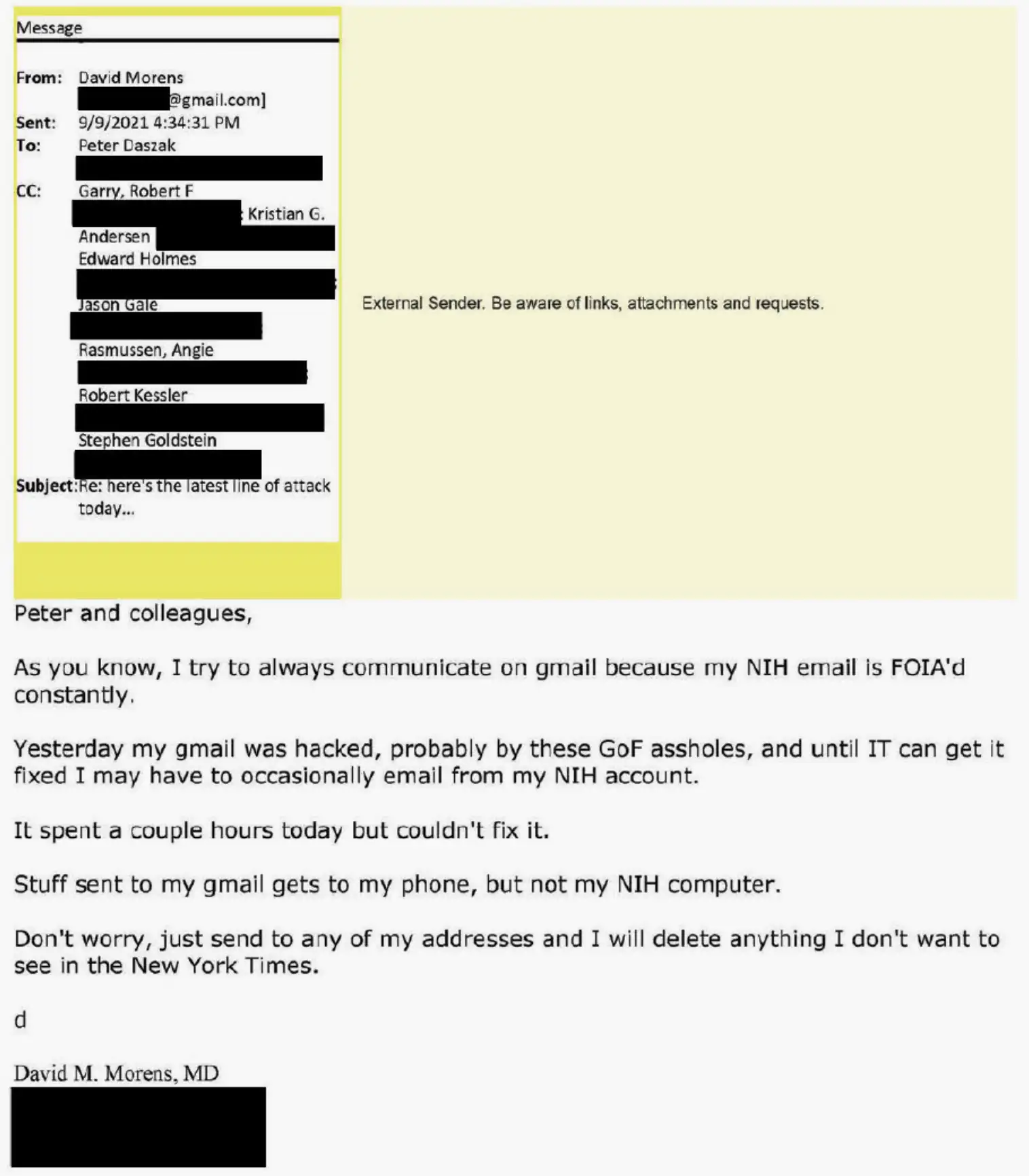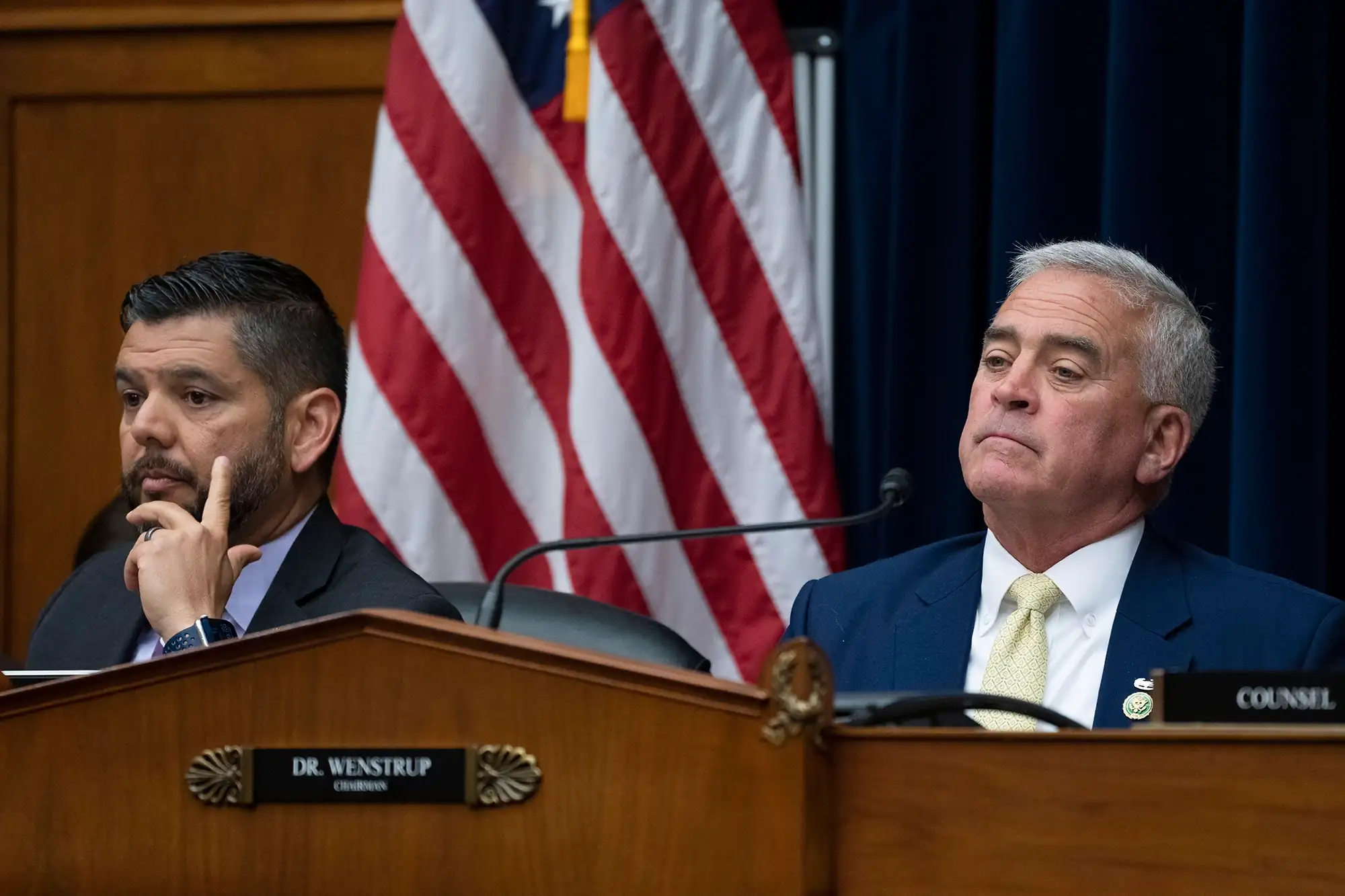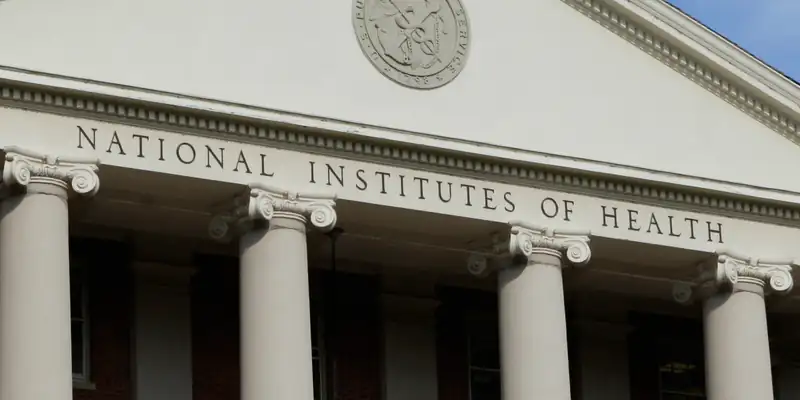David M. Morens, a high-ranking official at the National Institutes of Health, told prominent scientists discussing Covid’s origins that he would delete emails.
A TOP ADVISER to Anthony Fauci at the National Institutes of Health admitted that he used a personal email account in an apparent effort to evade the strictures of the Freedom of Information Act, according to records obtained by congressional investigators probing the origin of Covid-19. The official also expressed his intention to delete emails in order to avoid media scrutiny.
“As you know, I try to always communicate on gmail because my NIH email is FOIA’d constantly,” wrote David M. Morens, a high-ranking NIH official, in a September 2021 email, one of a series of email exchanges that included many leading scientists involved in the bitter Covid origins debate. “Stuff sent to my gmail gets to my phone,” he added, “but not my NIH computer.”
After noting that his Gmail account had been hacked, however, he wrote to the group to say that he might have to use his NIH email account to communicate with them instead. “Don’t worry,” he wrote, “just send to any of my addresses, and I will delete anything I don’t want to see in the New York Times.”

Morens is a 25-year veteran of NIH who serves as a senior scientific adviser to the director of the National Institute of Allergy and Infectious Diseases, a position held by Fauci until his retirement late last year. Other scientists on the email exchanges include Peter Daszak of EcoHealth Alliance; Robert Garry of Tulane University; Edward Holmes of the University of Sydney in Australia; Kristian Andersen of Scripps Research; and Angela Rasmussen, who works at the Vaccine and Infectious Disease Organization in Canada. They have all been outspoken proponents of the natural origin theory of Covid’s emergence. Jason Gale, a journalist at Bloomberg, also participated in the email exchanges, which were first obtained by investigators from the Republican-led Select Subcommittee on the Coronavirus Pandemic.
Scott Amey, the general counsel at the nonpartisan Project on Government Oversight, said the conduct described in Morens’s email could potentially violate agency regulations, including the Department of Health and Human Services’s email records management policy, and potentially civil and criminal record retention laws.
“His comments in that email are certainly worth an investigation by the agency, the agency inspector general, the National Archives and Records Administration, and the Department of Justice,” said Amey.
The email that contains Morens’s statements was part of a broader exchange in which Morens and his scientist correspondents denounced media coverage by The Intercept and other publications concerning the origins of Covid and harshly criticized those who take seriously the possibility that the virus emerged from a research accident in Wuhan, China. They also laid out their own arguments in favor of a natural origin for the virus.
“The lab leakers are already stirring up bullshit lines of attack that will bring more negative publicity our way — which is what this is about — a way to line up the [gain-of-function] attack on Fauci, or the ‘risky research’ attack on all of us,” wrote Daszak in one email on September 7.
“Do not rule out suing these assholes for slander,” wrote Morens in response.
In a separate email, Morens slammed scientists such as Richard Ebright of Rutgers University, calling them “harmful demagogues.” He also lamented the media’s platforming of such figures.
“They need to be called out. Because I am in government I can only fo [sic] this off the record, but I have done do [sic] again and again,” he wrote. “Some of them are knowingly promoting false equivalences [sic]. If they interviewed a Holocaust survivor, they would say they have to give equal time and space to a Nazi murderer. They have no shame.”
You can read the full set of documents here.
david_morens_nih_emails_redactedOn Thursday, Rep. Brad Wenstrup, R-Ohio, the chair of the Select Subcommittee on the Coronavirus Pandemic, sent a letter to Morens about the documents the subcommittee obtained.
20230629-brw-letter-to-dm-re-origins_redactedDocuments in the possession of the subcommittee, he wrote, “suggest that you may have used your personal e-mail to avoid transparency and the Freedom of Information Act (FOIA), potentially intentionally deleted federal records, and acted in your official capacity to disparage your fellow scientists, including by encouraging litigation against them.”
The committee also highlighted a July 2021 email sent by Morens in which he described getting approval from “Tony” — an apparent reference to Fauci — to give an interview to National Geographic about the origin of Covid.
“For many months, I have not been approved to talk about ‘origins’ on the record. But today, to my total surprise, my boss Tony actually ASKED me to speak to the National Geographic on the record about origins,” Morens wrote at the time. “I interpret this to mean that our government is lightening up but that Tony doesn’t want his fingerprints on origin stories.”

Photo: Manuel Balce Ceneta/AP
The committee in its letter said that this email raises “concerns that you may have knowledge or information suggesting Dr. Anthony Fauci … wished to influence the COVID-19 origins narrative without his ‘fingerprints.’”
“This is all very troubling,” wrote Wenstrup in his letter to Morens, “and raises serious questions.” The select subcommittee has asked Morens to produce a variety of additional records, including from his personal email account, and to sit for an interview.
Ethics experts consulted by The Intercept also expressed concern about Morens’s comments on FOIA compliance.
“When you evade laws that are meant to make government more transparent and accountable, that is very bad,” said Delaney Marsco, the senior legal counsel for ethics at the nonpartisan Campaign Legal Center. “It is bad for public trust in government. It is bad for agency culture. The ethical implications are bad.”
This is a breaking story and will be updated as needed.

